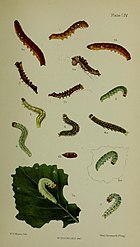Tetheella is a monotypic moth genus in the family Drepanidae described by Werny in 1966. Its single species, Tetheella fluctuosa, the satin lutestring, was described by Jacob Hübner in 1803. It is found from western Europe across the Palearctic to Kamchatka, Sakhalin Island, Korea and Japan.[2]
| Tetheella | |
|---|---|

| |

| |
| Scientific classification | |
| Domain: | Eukaryota |
| Kingdom: | Animalia |
| Phylum: | Arthropoda |
| Class: | Insecta |
| Order: | Lepidoptera |
| Family: | Drepanidae |
| Subfamily: | Thyatirinae |
| Genus: | Tetheella |
| Species: | T. fluctuosa
|
| Binomial name | |
| Tetheella fluctuosa | |
| Synonyms | |
| |
The wingspan is 35–38 mm. The forewings are light fuscous, white- sprinkled .The first line is whitish, limiting a broad darker central band including dark fuscous median and second lines, followed by a whitish dark-edged waved line. The subterminal is whitish, waved, preceded on the costa by an oblique dark fuscous dash. The hindwings are grey, with a pale postmedian line. The larva is yellow whitish; dorsal, fine subdorsal, and lateral lines fuscous; head reddish-ochreous, brown-marked.[3]

The moth flies from June to August depending on the location.
Subspecies
edit- Tetheella fluctuosa fluctuosa
- Tetheella fluctuosa isshikii (Matsumura, 1921) (Russian Far East, north-eastern and northern China, Korea, Japan)
References
edit- ^ Fauna Europaea
- ^ A review of the Thyatirin-moths (Lepidoptera, Drepanidae: Thyatirinae) of the Russian Far East
- ^ Meyrick, E., 1895 A Handbook of British Lepidoptera MacMillan, London pdf This article incorporates text from this source, which is in the public domain. Keys and description
External links
edit